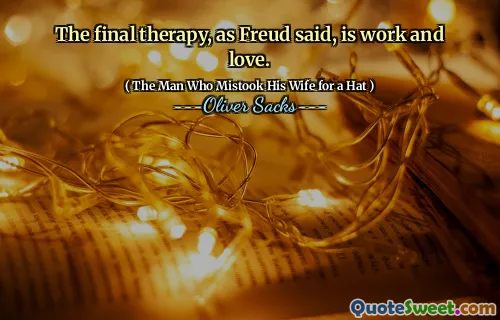
The power of music, narrative, and drama is of the greatest practical and theoretical importance. One may see this even in the case of idiots, with IQs below 20 and the extremest motor incompetence and bewilderment. Their uncouth movements may disappear in a moment with music and dancing – suddenly, with music, they know how to move. We see how the retarded, unable to perform fairly simple tasks involving perhaps four or five movements or procedures in sequence, can do these perfectly if they work to music
This quote by Oliver Sacks highlights the profound impact that music and artistic expression can have on individuals with severe cognitive and motor impairments. It underscores the idea that music operates on a neurological level distinct from language and rational thought, providing a gateway for connection and agency where traditional methods of communication or movement fail. The observations about individuals with extremely low IQs and motor difficulties demonstrate that music can evoke innate responses, bypassing the cognitive barriers that inhibit normal functioning. This suggests that music has a potent therapeutic value, not merely as entertainment but as a means to unlock potential and foster rehabilitation. From a neurological perspective, music activates multiple brain regions, including those involved in emotion, motor coordination, and memory, which might explain its effectiveness in these contexts. Moreover, these insights challenge us to reconsider the traditional understanding of intelligence and capability—indicating that even individuals considered profoundly disabled may possess unseen depths of responsiveness when approached through musical stimuli. For caregivers, therapists, and educators, this highlights the importance of integrating musical and artistic therapies into treatment plans, fostering a sense of accomplishment, dignity, and connection for those who might otherwise be overlooked or underestimated. These observations also echo a broader philosophical reflection about the inherent power of the arts to bridge gaps created by neurological and psychological differences, emphasizing their vital role in human experience and healing.







